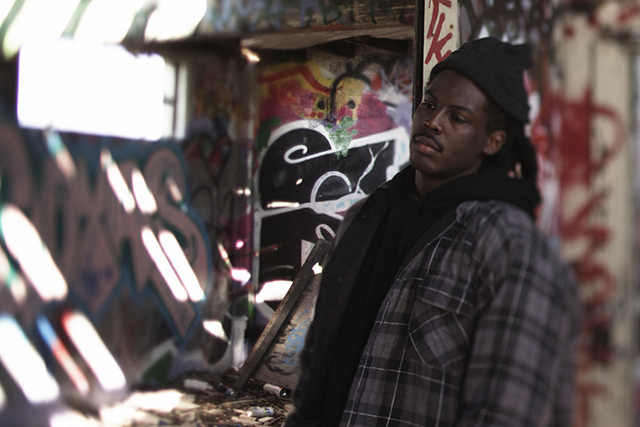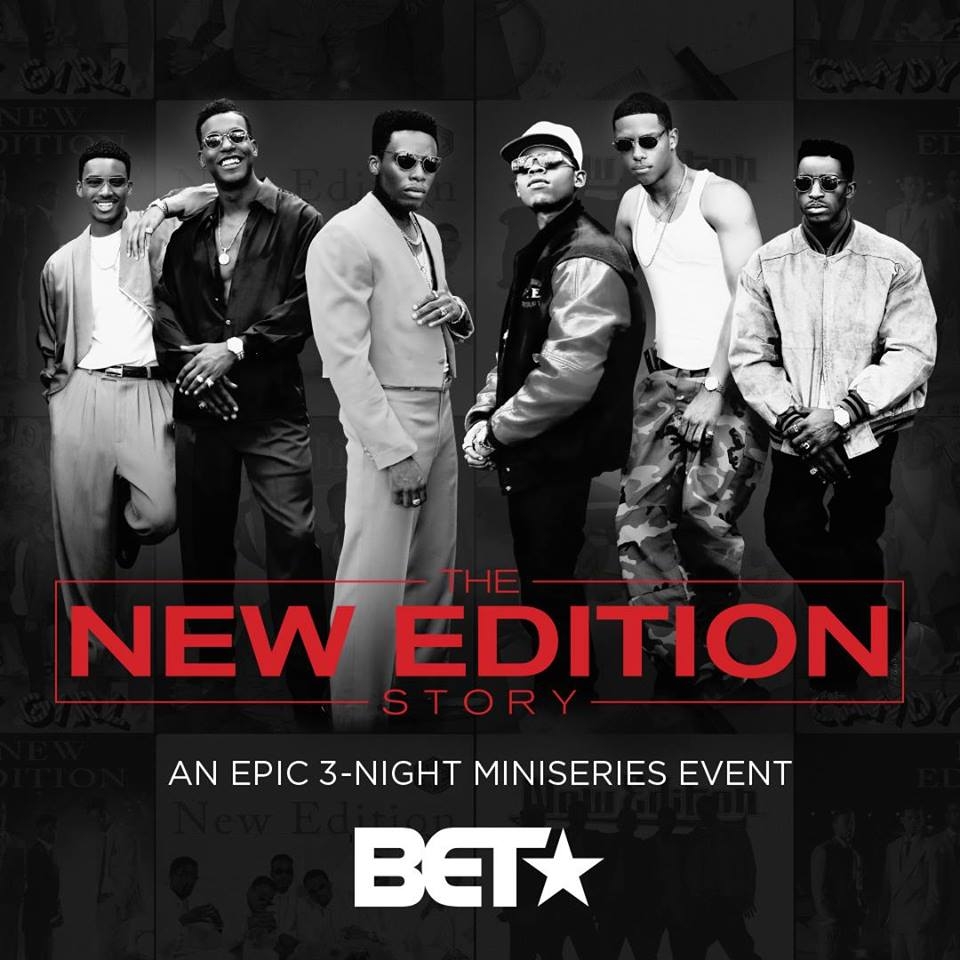 The iconic musical group that shattered records and broke down doors is finally getting a biopic that has been nearly thirty years in the making. BET‘s “The New Edition Story” follows the legendary R&B group from their 1978 humble beginnings in the Orchard Park Boston Projects through breakups, reunions and everything in between. With director Chris Robinson (ATL) and executive producer, Jesse Collins at the helm and with the rare blessing and backing of real-life New Edition members who served as consultants and co-producers on the film, “The New Edition Story” just might hit the nail right on the head. The multi-talented cast includes Bryshere Y. Gray as Michael Bivins, Elijah Kelley as Ricky Bell, singer-songwriter Luke James as Johnny Gill, Algee Smith as Ralph Tresvant, Keith Powers as Ronnie Devoe, and Woody McClain as Bobby Brown.
The iconic musical group that shattered records and broke down doors is finally getting a biopic that has been nearly thirty years in the making. BET‘s “The New Edition Story” follows the legendary R&B group from their 1978 humble beginnings in the Orchard Park Boston Projects through breakups, reunions and everything in between. With director Chris Robinson (ATL) and executive producer, Jesse Collins at the helm and with the rare blessing and backing of real-life New Edition members who served as consultants and co-producers on the film, “The New Edition Story” just might hit the nail right on the head. The multi-talented cast includes Bryshere Y. Gray as Michael Bivins, Elijah Kelley as Ricky Bell, singer-songwriter Luke James as Johnny Gill, Algee Smith as Ralph Tresvant, Keith Powers as Ronnie Devoe, and Woody McClain as Bobby Brown.
At a recent screening of night one of the three-night event, I got the opportunity to chat with director Chris Robinson, Jesse Collins, Elijah Kelley, Luke James, Algee Smith, Keith Powers and Woody McClain. I also spoke with Dante Hoagland who plays a young Mike Bivins and Caleb McLaughlin who plays a young Ricky Bell. From the real-life vocals to those exquisite dance moves here is everything you need to know about, “The New Edition Story” ahead of its premiere.
Aramide Tinubu: Chris, I know you’ve stated previously that your very first concert was New Edition, so what was it like sitting in the director’s chair in a film about this iconic group?
Chris Robinson: You know what, it was a lot of pressure. These gentlemen are alive and well and they are professionals who still tour and still make magic with their music. Of course, being a big fan when you do a movie that is an act of non-fiction there is a lot of responsibility to tell a great story. You also have a responsibility to tell the story in an accurate way that respects the actual people that you are portraying. Sometimes you have to have reverence for them, and sometimes you have to tell the very difficult truth, and many times people who are involved with projects like this don’t like to see themselves in a certain light. There is absolutely a process that goes along with that. So when you’re tackling a biopic, especially when the people are here and alive and have an opinion, it’s a big deal. So for me being a fan and having such great relationship with our producer and BET, I wanted to take in on, and I’m glad I did.
AT: Jesse, what made you decide to do “The New Edition Story?” How did you get Chris Robinson on board?
Jesse Collins: So this story came from working with the guys, and I just saw how the dynamics of the group are just so fascinating. It’s not anything that anyone thinks it is and they kept this story away from us for so long and now getting the opportunity for them to pull back the curtain and show us how the group works is unbelievable. I got Chris Robinson involved because I’ve worked with Chris on a lot of awards shows and, “Real Husbands of Hollywood” and I knew that he could bring a vision to this movie that it needed so, we got him to get on board.
AT: Chris, what was your vision for the miniseries going into it when it was time to bring New Edition’s story to life?
CR: Since New Edition was my first concert as a teenager, I kind of feel like I prepped for 35-years in order to make this film. It was all about being authentic. Jessie Collins has spent 10-years creating this project. He told me about it years ago, and since then, the script turned into three scripts. We just knew that we needed to make sure that all of these NE Lifers were happy. When you make a biopic, and the people are here, you have a responsibility not only to tell an amazing story but to make sure that it’s right. Listen, every video, every commercial, every movie, it feels like this is a culmination of all of those skills. We shot three feature films in thirty-seven days, which mean that everything had to be right. Every perfect little point, everything. Some soldiers fell along the way. (Laughing) But, the beautiful thing about it was that the work shows. We were dedicated to the story, we were dedicated to the group, and these guys were dedicated to the craft.
AT: Let’s talk about how you all came on to the project.
Algee Smith: It’s funny because I actually auditioned to play Mike Bivins first. Then, they had me go back and audition for Ralph, so that was a funny moment.
AT: Keith what was it like to become Ronnie Devoe?
Keith Powers: It was amazing; I think it was such a blessing. It was a great deal of responsibility. However, it was a dream come true, because we got to really play these legends.
AT: This is the second time you played a real-life character, you played Tyree, Dr. Dre’s little brother in “Straight Outta Compton,” how was this experience different?
KP: In “Straight Outta Compton,” I was introducing people to Tyree, people didn’t know who he was unless you really know Dr. Dre, so I kind of got to introduce him the way that I really wanted to. Whereas with this project, people know Ronnie, so I have to really show them Ronnie on the screen. I couldn’t just do what I wanted and call it Ronnie because people can go online and pull up pictures of him and all of that, so it was really just introducing the character versus taking somebody that everyone is familiar with and putting him on the screen.
Continue reading at Shadow and Act.
Image: BET

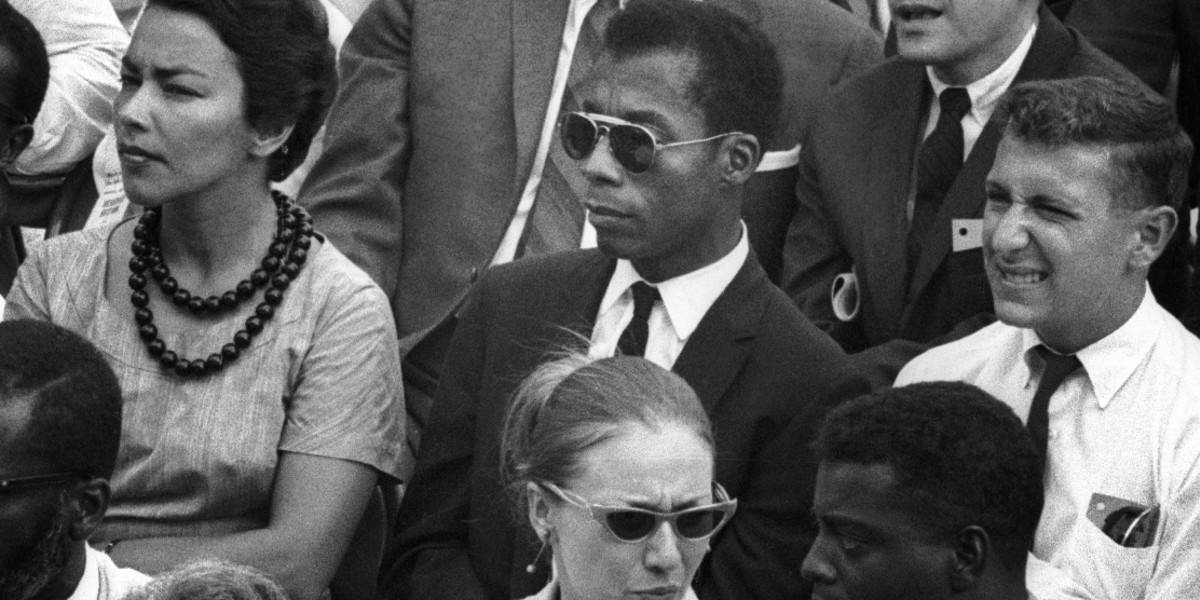 I have always known what it means to be Black, but being Black in America was something I had to discover. As a middle-class Black girl born and raised on the South Side of Chicago to parents who deeply valued education, I lived in a bubble of sorts. All types of literature and films about Black history and pride were available to me, and the spaces where I spent my childhood, my elementary and high schools, summer programs and my neighborhood were full of all types of Black people. My mother had subscriptions to Ebony, Essence, and Jet, and my father on a night out, would dress regally in Nigerian lace; gold glittering both himself and my mother. I’d learned of Civil Rights and had even experienced racism myself; though discussed briefly and forgotten quickly, when I stepped over the threshold of my house. This world that my parents had so diligently forged for their eldest dark-skinned daughter was promptly shattered when I arrived in New York City for undergrad. It was there that I truly discovered what it means to be Black in America.
I have always known what it means to be Black, but being Black in America was something I had to discover. As a middle-class Black girl born and raised on the South Side of Chicago to parents who deeply valued education, I lived in a bubble of sorts. All types of literature and films about Black history and pride were available to me, and the spaces where I spent my childhood, my elementary and high schools, summer programs and my neighborhood were full of all types of Black people. My mother had subscriptions to Ebony, Essence, and Jet, and my father on a night out, would dress regally in Nigerian lace; gold glittering both himself and my mother. I’d learned of Civil Rights and had even experienced racism myself; though discussed briefly and forgotten quickly, when I stepped over the threshold of my house. This world that my parents had so diligently forged for their eldest dark-skinned daughter was promptly shattered when I arrived in New York City for undergrad. It was there that I truly discovered what it means to be Black in America.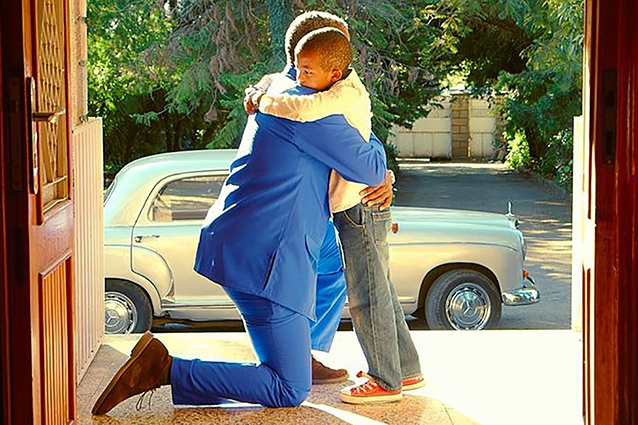 Feature narratives coming out of Ethiopia are exceedingly rare; stories about love and finding one’s place in the world are even more exceptional. Ethiopian American filmmaker Messay Getahun’s beautifully shot “Lambadina (Night Light)” which chronicles a young man’s journey from Addis Ababa, Ethiopia to Los Angeles, California changes all of that. Westerns have often had the privilege of ignoring war or forgetting altogether just how deeply war and political unrest can devastate and uproot entire families. Told in both Amharic and English, “Lambadina” tells the story of 9-year old Joseph, who is torn away from his father, and reluctantly taken in by an affluent family to live as an errand boy. In a twist that pays reverence to the eternal tale of Romeo & Juliet, Joseph falls in love with the family’s only daughter, Ruth.
Feature narratives coming out of Ethiopia are exceedingly rare; stories about love and finding one’s place in the world are even more exceptional. Ethiopian American filmmaker Messay Getahun’s beautifully shot “Lambadina (Night Light)” which chronicles a young man’s journey from Addis Ababa, Ethiopia to Los Angeles, California changes all of that. Westerns have often had the privilege of ignoring war or forgetting altogether just how deeply war and political unrest can devastate and uproot entire families. Told in both Amharic and English, “Lambadina” tells the story of 9-year old Joseph, who is torn away from his father, and reluctantly taken in by an affluent family to live as an errand boy. In a twist that pays reverence to the eternal tale of Romeo & Juliet, Joseph falls in love with the family’s only daughter, Ruth. Some weeks ago, I logged into Facebook and became enraptured by a status an old college friend had recently posted. It read, “I trust Black women more than any other group of people.” Initially, I thought nothing of it, since it also rang true for me, but as I scrolled through the comments under the post, it was clear that my brown skin girlfriend had hit a nerve.
Some weeks ago, I logged into Facebook and became enraptured by a status an old college friend had recently posted. It read, “I trust Black women more than any other group of people.” Initially, I thought nothing of it, since it also rang true for me, but as I scrolled through the comments under the post, it was clear that my brown skin girlfriend had hit a nerve.
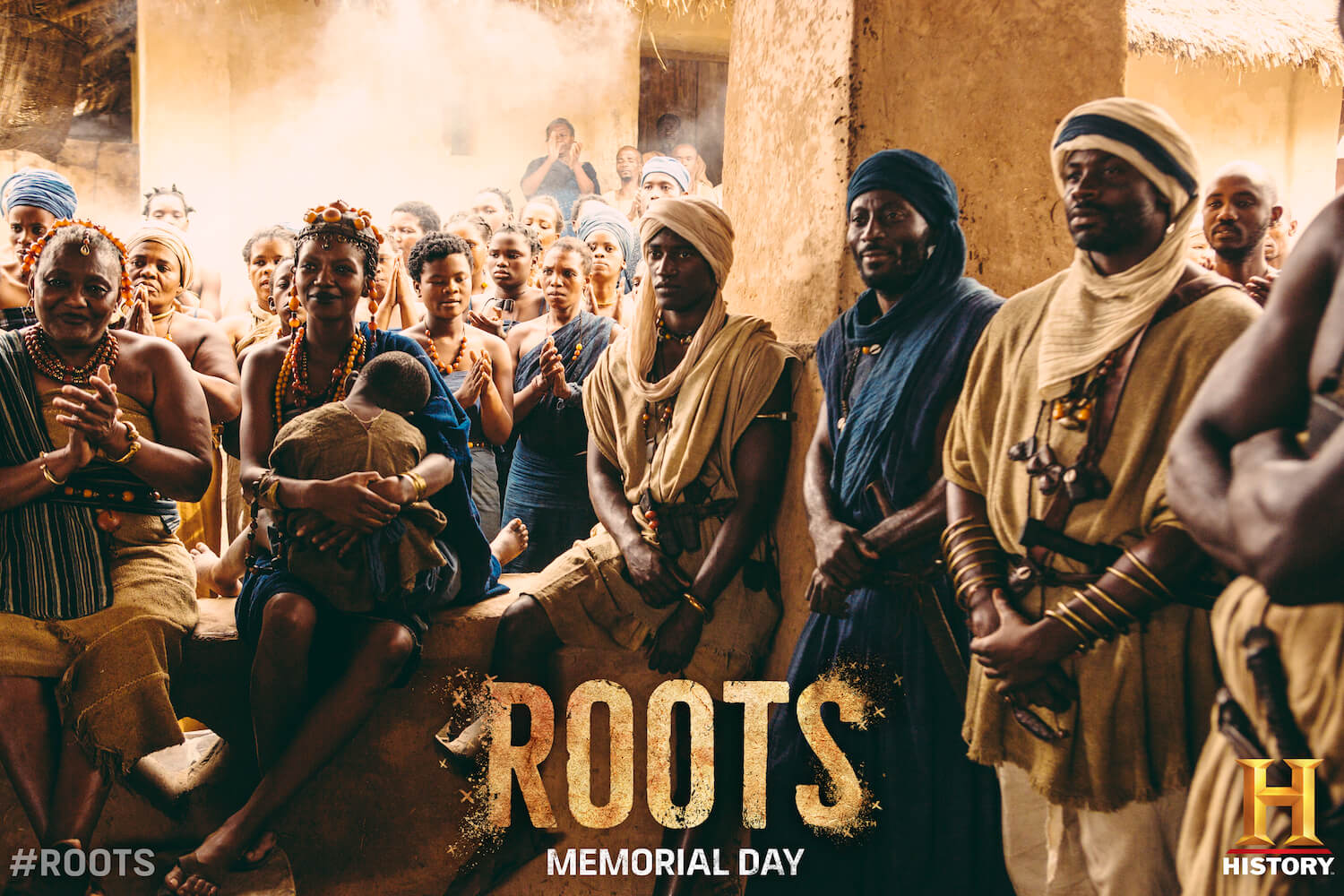 Forty-years ago Alex Haley’s “Roots” was presented on the small screen and captivated a nation. The immensely popular and moving story garnered 80 million viewers a night when it first aired in January of 1977. That year it was nominated for thirty-five Emmys. Therefore, when I first heard that “Roots” was being rebooted, I rolled my eyes. We are at a point when we are constantly being beaten down by the same stories playing in an endless loop over and over again. And yet, from the moment the thriving beauty of Juffure, Gambia was revealed in 2016’s “Roots”, I knew this would be something worthwhile.
Forty-years ago Alex Haley’s “Roots” was presented on the small screen and captivated a nation. The immensely popular and moving story garnered 80 million viewers a night when it first aired in January of 1977. That year it was nominated for thirty-five Emmys. Therefore, when I first heard that “Roots” was being rebooted, I rolled my eyes. We are at a point when we are constantly being beaten down by the same stories playing in an endless loop over and over again. And yet, from the moment the thriving beauty of Juffure, Gambia was revealed in 2016’s “Roots”, I knew this would be something worthwhile.
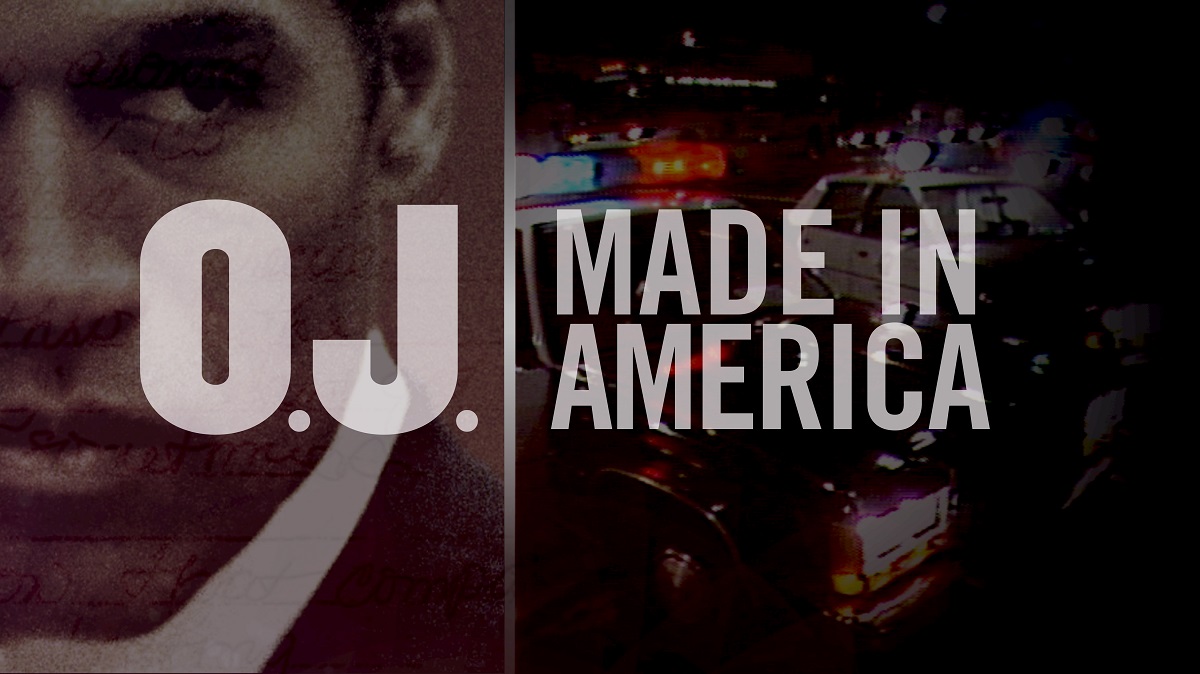 The year Orenthal James Simpson was acquitted of murdering his ex-wife Nicole Brown Simpson, and her friend Ron Goldman, I was entering Kindergarten. I vaguely remember the hoopla surrounding the trial, sitting on my father’s knee while he discussed it with his friends, or hovering around my mother and my aunts; my ears listening intently to “grown folks business”. The things that I heard at that time, I didn’t really grasp. As I grew older, especially as Simpson’s behavior became more publicly erratic leading up to his 2007 arrest and conviction, I formed my own opinions about the fallen man who in my eyes, was so obviously guilty of the heinous crimes. And yet for one moment in our country’s history, Simpson’s privilege without regard to his skin color let him slip through the system.
The year Orenthal James Simpson was acquitted of murdering his ex-wife Nicole Brown Simpson, and her friend Ron Goldman, I was entering Kindergarten. I vaguely remember the hoopla surrounding the trial, sitting on my father’s knee while he discussed it with his friends, or hovering around my mother and my aunts; my ears listening intently to “grown folks business”. The things that I heard at that time, I didn’t really grasp. As I grew older, especially as Simpson’s behavior became more publicly erratic leading up to his 2007 arrest and conviction, I formed my own opinions about the fallen man who in my eyes, was so obviously guilty of the heinous crimes. And yet for one moment in our country’s history, Simpson’s privilege without regard to his skin color let him slip through the system.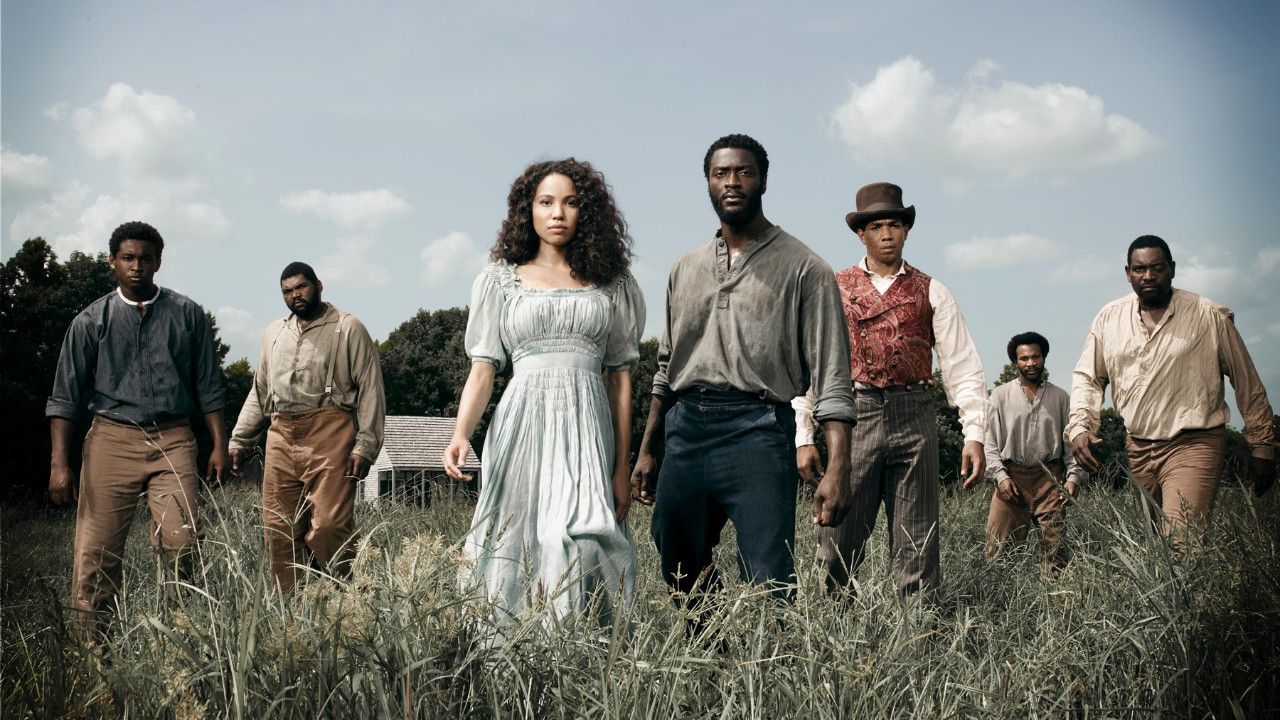
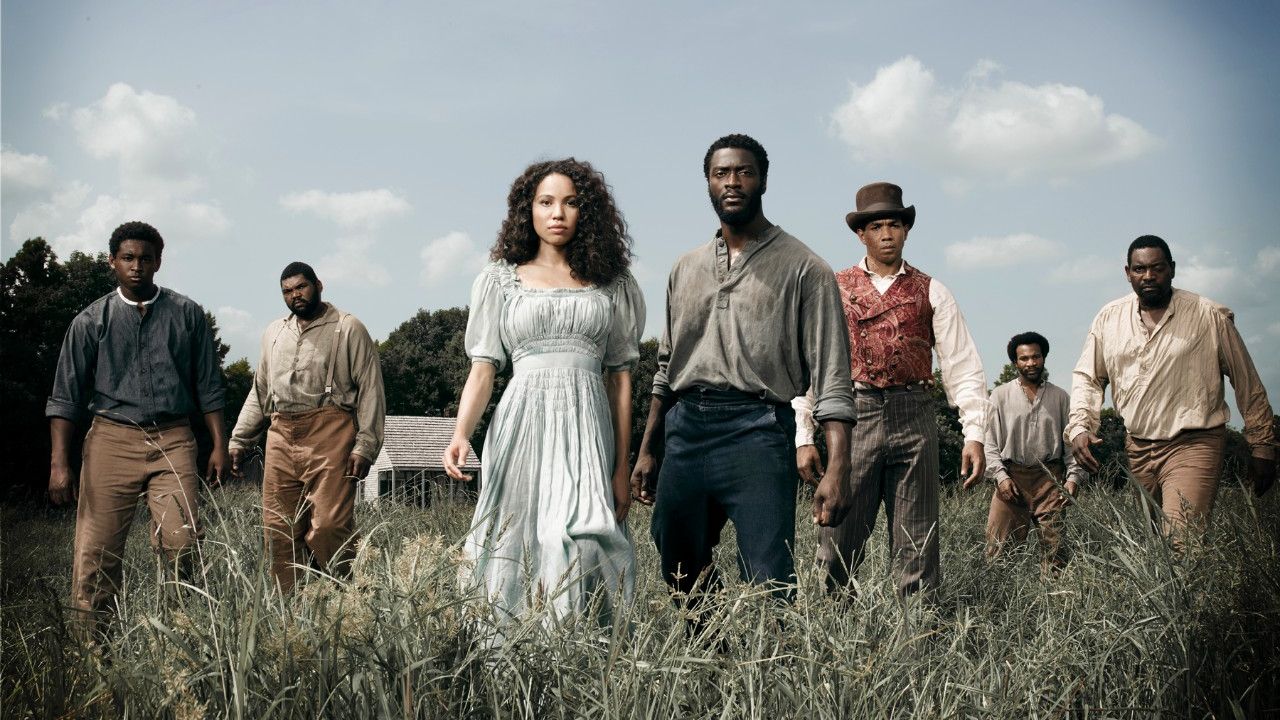 Personally, I’ve always found it puzzling when people denounce slave stories. Though black and brown faces are too often confined solely to films about slavery and enslavement, I still don’t relish the complete eraser of these tales. After all, this pivotal time in history has shaped not only our people, but our country as well. However, Black people do need to take on these stories ourselves. It should not be left up to the Hollywood establishment to present the history of our people on screen. It’s past time for us to take the reigns. With Nate Parker’s unprecedented success with his film “Birth Of A Nation” at this year’s Sundance Film Festival, and now with WGN America’s striking television series “Underground”, it seems that we are finally moving in that direction.
Personally, I’ve always found it puzzling when people denounce slave stories. Though black and brown faces are too often confined solely to films about slavery and enslavement, I still don’t relish the complete eraser of these tales. After all, this pivotal time in history has shaped not only our people, but our country as well. However, Black people do need to take on these stories ourselves. It should not be left up to the Hollywood establishment to present the history of our people on screen. It’s past time for us to take the reigns. With Nate Parker’s unprecedented success with his film “Birth Of A Nation” at this year’s Sundance Film Festival, and now with WGN America’s striking television series “Underground”, it seems that we are finally moving in that direction.


